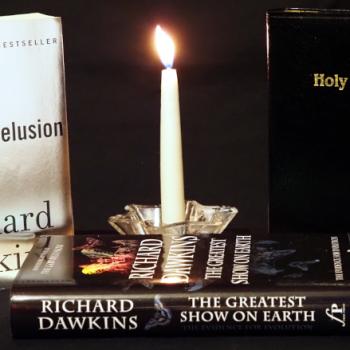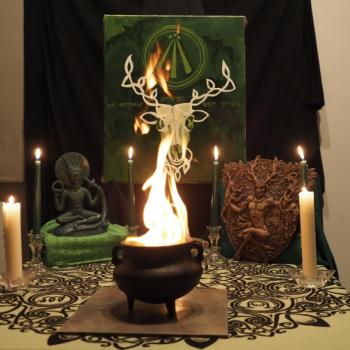So apparently the hot new trend is people using artificial intelligence to create courses and then selling them. And other people offering to show you how to make tons of money doing that… for a fee, of course. We’ve known for some time that there are many books on magic, witchcraft, and Paganism that are either written by AI, or are directly plagiarized from flesh-and-blood authors.
I haven’t written much about AI, because I haven’t seen the need. At this point it’s more of a search engine on steroids than anything we can properly call intelligence. It regurgitates what it thinks you want to hear (or see, in the case of images) with no new insights. I wrote better papers in high school. It’s still very new and the technology will likely get better – at some point we may have to have a serious debate about the place of artificial intelligence in our metaphysics. But that day is not today.
My concern today is with the people who think this trend is inevitable so we might as well get on the bandwagon. I think they’re wrong. Whether you’re a reader / student or an author / teacher – or both – I want you to know that these books and courses exist, that they’re not helpful, and that there’s a better way.
Caveat Emptor – let the buyer beware.

AI can’t vet its sources
Last week I put a post on Instagram asking for recommendations for magical people to follow. I was trying to find people who are informing and inspiring, but who I’m overlooking because they aren’t in my usual circles. Yvonne Aburrow responded with 15 names – I immediately followed them all. I’ve known Yvonne for a long time – they were an alpha reader for The Path of Paganism – and I trust them. So I didn’t have to vet their suggestions. I couldn’t be sure I’d enjoy following all of their suggestions, but I was confident none of them are folkish or TERFish or someone who teaches concepts I’d find ridiculous or harmful.
That’s what you get when you read a book or take a course from a flesh-and-blood author: ideas, practices, and suggestions the author has enough experience with to recommend to others. Anything I put out is something that’s important enough to me that I’ve given it some serious thought, tried it out for myself, and found it inspiring enough to write about. I can’t promise you I’m always right – I’m not – but I can tell you I’ve thought seriously about everything I create. I’ve vetted the material for you.
You don’t get that with AI. You get what the algorithm thinks you want to hear. It draws on the resources of the internet, which as anyone who’s been online for more than 15 minutes knows is filled with misinformation, half truths, and outright lies. Yes, the better algorithms (including ordinary search engines like Google) try to assess the reliability of various sources, but mainly it weeds out things that are so bad they’re not popular.
Always check your sources. You can’t do that with AI in spiritual education.
AI can’t give you a connection to an author
I’ve seen a couple people who say that AI-created spiritual education is just the next point on the slippery slope that started with book-taught solitary practitioners. They say these things were intended to be taught person-to-person, face-to-face, and once we got away from that, this was inevitable. I don’t agree.
When you learn from a book or a course, you learn from the author. When I reviewed Deborah Castellano’s Magic For Troubled Times, I said it was the closest thing you can get to apprenticing under an experienced witch without actually going to the witch’s cottage and stirring her cauldron while she explains the spells you’re helping her cast.
The Path of Paganism and Paganism in Depth are my words, written by me. They’re what I would teach you if you were sitting in my living room sharing a pot of tea with me. My courses are even closer to that experience – you’re hearing my voice, speaking unscripted (I use PowerPoint slides the same way I use outlines with in-person presentations – they’re prompts, not a script).
It’s not the same as actually being there – that’s why I enjoy Pagan conferences and festivals so much. But what you learn is much the same.
You don’t get that with AI. You get a mishmash of vague and generic concepts from a mishmash of vague and unknown sources. There’s no human connection, not even one mediated through a book or a computer.
Much of AI is unethical
All of this is before we get to the ethics of AI. Facts can’t be owned and information wants to be free, but books are the work of their authors and therefore their intellectual property. Taking them and repackaging them into some slick e-book on Amazon is theft. It gets worse when we talk about photography and other visual arts. AI has to start somewhere – it starts with an existing picture, created by a human. AI “artwork” isn’t derivative work – it’s plagiarism.
And considering how little most authors, photographers, and visual artists make, the theft is significant. Theft is never OK, but the argument that stealing from record companies and movie studios is no big deal is far weaker when it comes to the material AI is stealing.
AI in someone’s presentation
A couple months ago I came across a video by someone I used to follow (no, I won’t name them, for multiple reasons) who used AI to create their presentation. At least they were honest about it. They pointed out some places where AI got facts wrong, but mainly they used it as their talking points. My initial reaction was “how lazy can you get?” If I wanted AI’s take on a subject I could have asked it myself. I wanted the presenter’s thoughts and ideas.
At least it was free. But it still cost me time. That’s not the reason why I no longer follow them, but it’s yet another reason why I’m unlikely to follow them again.
Learn to spot AI-created works (it’s not hard)
If you’re a reader, I encourage you – I implore you – to avoid AI-created spiritual education. It’s not hard to spot, but sometimes you have to do a little investigation. If you don’t know the author, look them up. Do they have the kind of internet and social media presence that indicates they’re a real person? I’m not going to carry on a casual conversation with someone I don’t know (or with someone I do know), but I do my best to answer questions. Most authors in the Pagan and magical world will answer inquiries. If you don’t know them, can’t find them, and can’t find anyone else who knows them, odds are good they’re not a real person.
Also look at their catalog. Do they have an impossibly large offering of books and/or courses, publishing at a rate no human could accomplish? If their output is greater and faster than Morgan Daimler (whose output amazes me) they’re probably not human.
Authors and teachers: offer what AI can’t
In the first season of Penny Dreadful, Brona tells Ethan “I’m off to look for work that a machine can’t do… yet anyway.” There’s wisdom in that for us. Which is not to say we should be whores but that we have to offer our readers, students, and clients something AI can’t give them.
The most valuable thing we can offer is our experience. Anyone can write about the Wheel of the Year. Only a handful of people can write about celebrating the Fall Equinox in Denton, Texas for twenty years. Most anyone can write about a deity. Only a few of us can write about our first-hand experiences of Cernunnos.
Yes, there’s still a need for Witchcraft 101 books. Yes, there’s still money to be made from writing them. The Path of Paganism (which I consider a 200 level book) outsells Paganism in Depth (a 300 level book) four to one. But we don’t create value by repackaging the same old material for a new generation. We create value by bringing new and unique approaches to timeless traditions.
AI can’t do that. AI will never be able to do that, because AI can’t imagine a new ritual, go outside in the back yard, light some candles, and then do witchcraft. And then write about it.
Lineage flows through people
The other thing we can give people is lineage. Now, “lineage” has a specific meaning in some traditions, especially in Gardnerian Wicca. Here I mean it more generically.
When you read Mat Auryn’s Psychic Witch you learn from Mat and his experiences. But you also learn from the people who taught Mat, and the people who taught them. Mat lists Laurie Cabot as one of his biggest influences. I read some of her books very early on my Pagan journey and I can see her influence in his work. Not in a way that would be plagiarism, but in a way that is truly derivative work. Mat took what he learned from Laurie and built on it (and added his own original work, of course). Someday someone will take Mat’s teachings and build on them, taking that line of witchcraft to new depths – they will extend the lineage.
This is how people become spiritual ancestors. This is how we find our spiritual ancestors. As a Druid, Ross Nichols is my spiritual ancestor. I learned from his books, I learned from his direct spiritual descendant (Philip Carr-Gomm), and I learned from the order Nichols founded. Transmission of ideas creates a spiritual lineage. AI can’t do that.
Caveat Emptor – let the buyer beware
AI is still very new. It is likely to get better over time. There may come a day when it has a use in spiritual education beyond a low-value cheat code, but that day is not today.
Caveat Emptor – let the buyer beware. Know what you’re buying, where it comes from, and who created it. Magical, religious, and spiritual education created by AI may be cheap and easy, but it hasn’t been vetted. Even if it’s not wrong, it’s going to be bland and generic. Spend your money and time on something better.
If you’re an author or a teacher – or if you want to be – I encourage you to offer what AI can’t: your own experiences, your own thinking, and the lineage of which you’re a part.
AI is going to be part of our world going forward. Let’s make sure it’s always our servant and never our master – or our teacher.




















